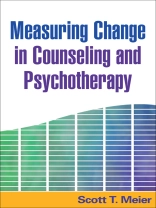This book provides researchers, clinicians, and students with a useful overview of measuring client change in clinical practice. It reviews the history, conceptual foundations, and current status of trait- and state-based assessment models and approaches, exploring their strengths and limitations for measuring change across therapy sessions. Meier shows how to effectively interpret and use measurement and assessment data to improve treatment evaluation and clinical care. A series of exercises guides the reader to gather information about particular tests and evaluate their suitability for intended testing purposes.
表中的内容
1. Introduction and Rationale Contemporary Psychological Testing Contemporary Psychotherapy Research and Practice The Implications of Research Stuckness for Clinical Practice Summary and Conclusions2. A History of Traits The Seeds of Conflict The Desire to Be Scientific The Model of Physiology Biology and Individual Differences The Desire to Be Relevant The Need for Classification The Consequences of the Adoption of a Trait-Based Measurement Paradigm Loss of Experimental Methods Inhibits Recognition of Method Variance The Gain of Traits and Loss of Situations Handling Error with Classical Test Theory Statistics Related to Measurement Assessment as a Complement to Measurement Deemphasizing Measurement Theory Loss of Precision The Wisdom and Tyranny of Tradition The Success and Failure of the Market Summary and Implications3. Reliability, Validity, and Systematic Errors Introduction Thinking about Reliability and Validity Types of Validity Constructs, Theories, and Valid Measurement Construct Explication Multitrait–Multimethod Matrices: Investigating the Effects of Method Variance on Validity Campbell and Fiske Criteria for Construct Validity An MTMM Example Problems with Campbell and Fiske’s approach The Factor Analytic Approach to Construct Validity History of Self-Report and Interview Errors Self-Reports Interviews and Observational Methods Measurement Error Systematic Errors Associated with Self-Reports Dissimulation and Malingering Social Desirability Systematic Errors Associated with Ratings by Others Halo Errors Leniency and Criticalness Errors Causes of Inconsistency Cognitive Influences Item Comprehension Problems Test Cues Low Cognitive Ability Affective and Motivational Influences Test Anxiety Negative Emotional States Environmental and Cultural Influences Reactivity Stereotype Threat Summary and Implications4. States, Traits, and Validity Introduction History The Controversy of Mischel and Peterson: The Benefits of Conflict The Rejection of Traits: Behavioral Assessment Reinforcing the Trait Argument Person–environment Interactions Aptitude-by-Treatment Interactions Environmental Assessment Moderators of Cross-Situational Consistency Summary and Integration5. Context Effects and Validity Introduction Understanding Inconsistency: Clues from Psychophysics Measurement The Limitations of Psychophysical Measurement Conclusions and Implications from Psychophysical Research Improving the Principles of Construct Explication Test Purpose Test Content Test Context Shared Contexts and Method Variance Applications Recommendations Related to Test Purpose Recommendations Related to Test Content Recommendations Related to Test Contexts Summary and Implications6. Nomothetic Approaches to Measuring Change and Influencing Outcomes History and Background Examples of Nomothetic Measures Beck Depression Inventory State–Trait Anxiety Inventory Global Assessment of Functioning Outcome Questionnaire Psychometric Principles and Nomothetic Measures Reliability of Nomothetic Measures Validity Applications Creating Change-Sensitive Measures Psychometric Properties of Aggregate Scales Using Change-Sensitive Tests in Program Evaluations An Evidence-Based Approach to Supervision Summary and Integration7. Idiographic Approaches to Measuring Change and Influencing Outcomes History and Background Psychometric Principles and Idiographic Measures Reliability of Idiographic Measures Validity of Idiographic Measures Applications Begin with the Case Conceptualization
关于作者
Scott T. Meier is Professor and Chair of the Department of Counseling, School, and Educational Psychology at the University at Buffalo, The State University of New York. His main research and teaching are in the areas of psychological measurement (particularly outcome assessment), research methods (program evaluation), and counseling skills (integration of case conceptualization and assessment with intervention). Dr. Meier is a member of the American Evaluation Association, the Association for Psychological Science, and the Association for Behavioral and Cognitive Therapies. He is the author or coauthor of four books (including The Elements of Counseling) and has published in American Psychologist, Journal of Counseling Psychology, Measurement and Evaluation in Counseling and Development, and the American Journal of Evaluation.












